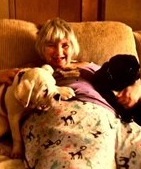Marilyn Schanbeck

My Aunt Marilyn passed away recently. She was disabled from birth. I am not sure they ever put a name to her disability but it was significant – mentally and physically. This is her story.
Marilyn was 8 or 9 when my Grandpa Harold passed away, leaving Grandma Mary to figure out how to make a living and care for Marilyn. Grandma was humble, kind, and hardworking. She was a housemother at group homes for the disabled for as long as I can remember. That way she could be with Marilyn every day and make a living at the same time. Her entire life revolved around Marilyn.
Oddly, in spite of her other disabilities Marilyn had a very keen memory. If you brought a baby, a kitty, a puppy or a doll with you to see her she would NEVER forget you or it. She would get all excited every time she saw you and ask you about that puppy – for the rest of your life. Literally.
Marilyn’s passing recently drew me back to a conversation I had one day with a woman who had met Marilyn briefly and made a comment about what a pity it was and that people who defend keeping those babies on life support when they are born are really being cruel. They don’t stop to think about the “quality of life” these children will have.
Of course, those of you who know me know I about came right out of my skin and it is hard to keep your cool when you are sitting on the couch – skinless. But I kept my cool and just prayed that the Lord would have mercy on her. She didn’t mean to be insensitive or harsh. She was just a product of an environment that didn’t include the benefit of a Marilyn in her midst.
It was a stark reminder that compassion looks markedly different from person to person depending the history of their own looking glass. It raises the stakes for the truly innocent who are helpless to defend their value in a world where ROI (return on investment) is generally accepted as an appropriate way to measure a person’s worth and a “quality of life” is more often associated with fulfilling the societal and cultural demands for material wealth and social status than with pure and simple happiness.
And Marilyn was, without a doubt, one of the happiest people I’ve ever known, and anyone who ever met her would say the same. We called her Giggle Box. Her giggle would fill a room and you’d be hard pressed to keep a straight face once she got started.
So when my brother sang the Lord’s Prayer at her funeral, the sound of the silence in the room when he was finished was almost deafening. Although it would have seemed wrong to the innocent bystander, and my Grandmother most certainly would have tried to hush her, had Marilyn been sitting in the funeral home she would have laughed and clapped and pointed at Danny saying his name over and over. She loved live music. And lucky for her, she was blessed in that she didn’t have that thing that makes us stay quiet and behave according to crowd protocol. If she wanted to laugh, she laughed.
And she laughed a lot. Marilyn found some things funny and everything else VERY funny. My Uncle Menno went by the name Babe. She thought that was hysterical as she had an obsession with babies and baby dolls and she was quite sure all six foot something of him was way too big to be a baby. In her mind, the joke was on us.
My cousin also reminded me that she loved to play a game we called “Who Dat?” She would point at someone and say, “Who dat?” Of course, we all knew that she knew, that we knew, that she knew. But we played along and would say some silly name like ‘Penelope’. She thought it was sooo funny trying to say a name that was so long and complicated. She would laugh and laugh and then she would shake her head no and tell you the person’s name. Game over. Giggle Box wins again.
Marilyn was very blessed at her last group home. Her roommate turned out to be a best friend. When Marilyn was sick and confined to her bed her roommate would sit in her wheelchair and hold Marilyn’s hand for hours trying to comfort her. When Marilyn was in the hospital this last time, her roommate came to hospital and cried at her bedside. Marilyn was lucky. Many people go through their entire life never having the blessing of a best friend. She had one to the very end.
On Monday, April 23, Marilyn’s organs failed and finally, after everything else had gone quiet, her heart stopped beating, too. Many years earlier when Marilyn was just a little girl the doctors had told my Grandmother not to expect Marilyn to live past 18 because the little thumper in her chest was weak and underdeveloped and just wouldn’t last. Marilyn was 65 when she died. I guess she got the last laugh. Never underestimate the tenacity of a happy heart.
Who’s made a difference in your rare disease? Whether it’s a teacher, parent, pastor, friend, or physician, if you want to recognize someone who has impacted your life, click here to nominate them! Not only do we hope to recognize those who have made a difference in the rare disease community, it is our hope that these stories motivate others with practical inspiration for how they can make a real, lasting impact in the community.
